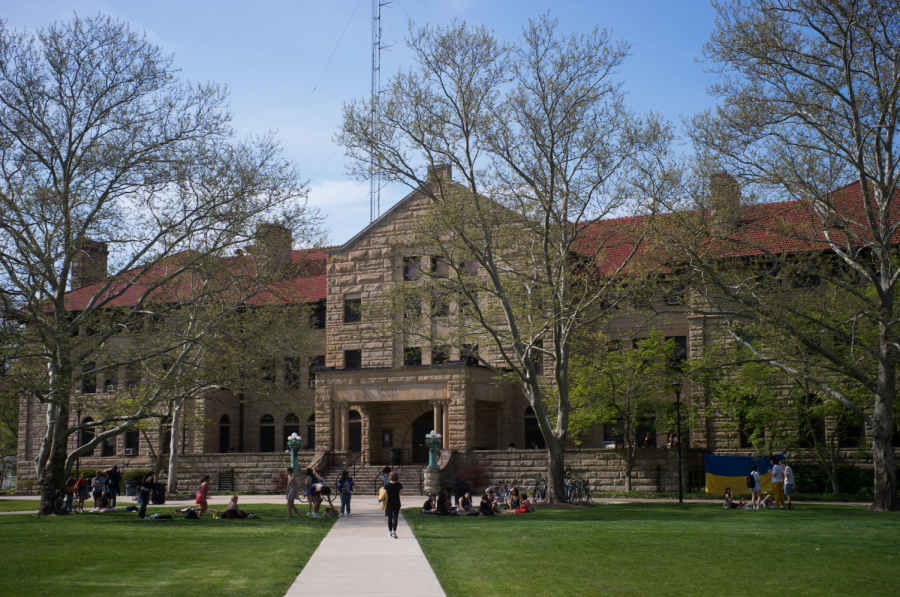College Set to Renovate Wilder Hall This Summer
This summer, the College will begin renovating Wilder Hall.
This summer, the College will start renovating the west side of Wilder Hall to upgrade the building’s furniture, functionality, and infrastructure. To accommodate the renovations, some organizations will temporarily move from their office locations in Wilder Hall.
The College completed the construction of Wilder Hall, originally a dorm, in 1911. The building now serves as the College’s Student Union and provides office spaces for organizations like WOBC-FM and the International Student Resource Center.
Due to pandemic-related social distancing and remote activities, some younger students have not had full access to in-person opportunities and spaces. According to Associate Dean of Students Thom Julian, the College hopes that the renovations of Wilder Hall will supplement this lack of experience and increase community involvement.
“The renovation hopes to respect that history while providing Oberlin students with a space that invites community-building and meets the functional needs of modern student involvement,” he wrote in an email to the Review.
College administrators met with student focus groups to ensure renovation plans met students’ desires. According to Julian, the focus groups expressed positive feedback toward initial renovation plans, and the construction team has begun forming preliminary designs.
“Under our current plans, the first part of the renovation will include connecting the Sustainable Infrastructure Program to Wilder Hall and upgrading the mechanical functions of the building,” Julian wrote. “Our goal is to balance completing the renovation expeditiously while minimizing the disruption to campus services within the building.”
Although renovation plans may change slightly due to the complexity of the construction process, the College’s broader hope is to create new gathering spaces for students and rehouse student resource offices. Current plans include opening a new student lounge in Wilder Hall’s basement where students can study and socialize. The lounge will also contain an esports arena and a reservable greenroom for artists performing at the ’Sco.
Besides new spaces, the renovations will also establish a new space on the first floor for the Office of Student Accessibility Services, which is currently housed in Peters Hall. OSAS will join other identity-based offices such as the Multicultural Resource Center, the Office of Religious and Spiritual Life, and the International Student Resource Center that will remain in Wilder Hall.
While the renovations bring exciting new opportunities for students, some worry that they will harm the building’s institutional memory. For example, although WOBC will receive new equipment and potentially a new space within Wilder Hall, some students are concerned renovations will harm the station’s memory and history housed within its current office.
“I think out of all the student organizations, we are probably the one that’s most tied to the physical space of Wilder,” College fourth-year and WOBC Station Engineer Katie Frevert said. “We have our space. It’s very established. We’ve been in the same location since the ’60s.”
WOBC’s history exhibits itself in the office’s walls and windows, which are covered in historical stickers and graffiti. According to Frevert, the renovation’s architects, Julian, and WOBC representatives have had conversations about how the renovation can best serve WOBC and maintain the office’s tangible history.
“The windows in various places are just covered in all sorts of stickers from bands that send their music in or from different shows that have happened at Oberlin in the past,” said Frevert. “[We want to] display it somehow in the new incarnation of the station, keep some physical elements of the station [and] not completely uproot ourselves. … This particular space holds a lot of memories for people, which is something that’s really important. We want to be able to try to transfer that however we can.”
However, the COVID pandemic has prevented some younger students involved with WOBC from using the space as much as students might have in the past, which may cause them to have less attachment to the physical space.
“If you’ve had more time to spend in the space, you’re going to associate the space more with that community,” College second-year and co-director of WOBC’s news workgroup Hazel Feldstein said. “I would personally theorize that this transition, happening now after the loss of the community and memory, is not going to be as much of an upset as it potentially could have been.”
The College plans to cease renovations of Wilder Hall in the fall and resume in summer 2023 to avoid interfering with student life.







